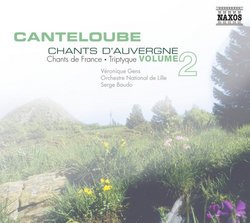| All Artists: Joseph Marie Canteloube, Serge Baudo, Orchestre National de Lille-Région Nord, Veronique Gens Title: Canteloube: Chants d'Auvergne, Vol. 2 Members Wishing: 0 Total Copies: 0 Label: Naxos Release Date: 10/30/2007 Genres: Folk, Pop, Classical Styles: Vocal Pop, Opera & Classical Vocal, Symphonies Number of Discs: 1 SwapaCD Credits: 1 UPC: 747313033874 |
Search - Joseph Marie Canteloube, Serge Baudo, Orchestre National de Lille-Région Nord :: Canteloube: Chants d'Auvergne, Vol. 2
 | Joseph Marie Canteloube, Serge Baudo, Orchestre National de Lille-Région Nord Canteloube: Chants d'Auvergne, Vol. 2 Genres: Folk, Pop, Classical
|
Larger Image |
CD Details |
CD ReviewsThe Reference Recording for these Works Terry Serres | Minneapolis, MN United States | 01/22/2008 (5 out of 5 stars) "It is hard to express how exquisite this recording is. I am not always sold on the musical importance of Canteloube. His Chants d'Auvergne can seem little more than tone poems with vocal obbligato. If you don't have a taste for woodwinds being used incessantly to evoke breezes, your interest can quickly wane. (Note, please, that this dismissiveness is only half-serious. As a lover of folk idioms as well as classical music, I recognized that Canteloube memorably bridged the two, as did others such as Grainger, Brahms, Stravinsky, and Dvorák.) This recording easily lifts the music above the level of tone-poem. The notes mention that the singer herself, Véronique Gens, hails from the Auvergne region, and her affinity for the dialect is transparent. She has an uncanny ability to use, with expressive finesse, the local exclamations that punctuate so many of these songs -- the "Ta lirou" ... "Soun! soun!" ... "Tchut!" ... "Baïlèro, lèro" ... "Tro lo lo lèro" ... "Ti ouli ouli." She finds the perfect rhythm and inflection for each of these, rescuing them from being stale "quaintisms." In fact, one of the songs here, "Te l'co tè," seems to be a 45-second flurry of nothing but exclamations. Véronique Gens has, for my money, one of the most compelling voices in classical music today. Her voice has an innate intensity and drama that have distinguished her in many of the heavier Mozartean rôles and some Berlioz. Yet she has a purity that allow her to shine in early music, notably Rameau and Händel. And her clarity and sensitivity to language have made her rare recordings of mélodie (piano-accompanied art song) important contributions to the catalog. Twenty-plus years into her career, her voice retains its lustre. Her most recent recording, the *Tragédiennes* collection of French baroque arias, troubled me for its relentless intensity and lack of dynamic variation. There is no hint of that limitation with her Canteloube -- her every utterance on this disk is nuanced and luminous. The orchestra under Serge Baudo is a marvel -- the playing is limpid and charming, rich with detail. I won't claim to know the entire discography of the Chants d'Auvergne, but I came away with the distinct impression that this must be considered the reference recording for this work. This Volume 2 is much more than mere leftovers from Volume 1. While the first nine tracks complete the cycle of the Auvergne songs, the other offerings provide some welcome stylistic variety and further insights into Canteloube's art. The Triptyque is an exercise in lush impressionism. At first it may seem like a knock-off of Chausson, or maybe Debussy-lite, but these songs and their gorgeous poetry grew on me. The disk ends with a selection from another collection, Chants de France. These are quite distinct from the Chants d'Auvergne. They are much more overtly melodic than the glowing tonal haze that surrounds the more famous Auvergne songs. Together, these three sets provide a delightful variety that makes this second volume at least as enchanting and musically satisfying as the first. [...]. As for the complaint about the dearth of documentation -- musicianship of this caliber is its own documentation, and Naxos does a real service to the music-loving public by offering top-drawer performances at bargain prices. " Texts and Translations are Available Online at Naxos - and t J Scott Morrison | Middlebury VT, USA | 01/21/2008 (5 out of 5 stars) "While I understand customer reviewer Mr Rockwell's disappointment that the texts for the Canteloube songs are not included in the Naxos booklet, there is a note on the jewel case that indicates that texts and translations are available online at www.naxos.com/libretti/570338.htm and even though this is a bit cumbersome, the texts are not so voluminous as to make download of them a difficult process. Unfortunately, however, this solution is being offered more and more regularly by the issuers of vocal music. Ah, for the old days of thick booklets or libretto inserts.
As for the performances, they are of the same stellar quality as those in the first volume of this series: Joseph Canteloube: Chants d'Auvergne. Gens is a beautiful and poetic singer and she is given excellent orchestral support by Serge Baudo and the Orchestre National de Lille-Région/Pas-de-Calais. Also included are Canteloube's 'Triptyque', set to texts by Roger Frêne and in a style closer to Chausson than the Auverge songs. And also one hears six of Canteloube's settings of Chants de France (beginning with the familiar 'Auprès de ma blonde', which are similar in style to the Songs of the Auvergne. Recommended both for the performances and the budget price. Scott Morrison" |

 Track Listings (18) - Disc #1
Track Listings (18) - Disc #1